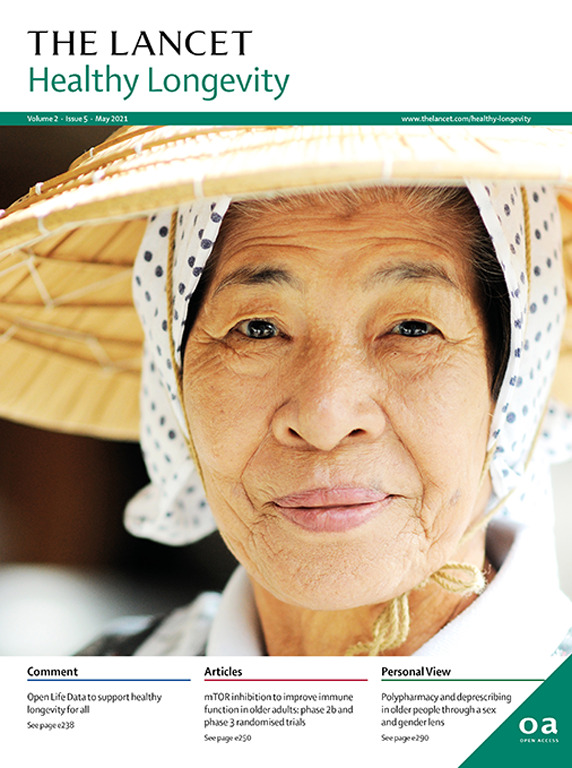志愿服务对孤独老年人孤独感的影响:heala - hoa双随机对照试验。
IF 14.6
Q1 GERIATRICS & GERONTOLOGY
引用次数: 0
摘要
背景:以前的随机对照试验主要依赖于志愿者自我报告的志愿工作来评估志愿服务的效果,并且很少在干预期间提供有组织的志愿活动。本研究旨在调查COVID-19大流行期间12个月的社会志愿工作对老年人孤独感的影响。方法:在香港进行了一项双随机对照试验,调查被筛选为孤独的中国老年志愿者对低收入、独居、感到孤独和被数字排斥的老年人进行电话传递的心理社会干预的长期效果。参与者年龄在50-70岁之间;同意接受培训,并在6个月内每周至少担任2小时的志愿者;至少受过3年的中学教育;没有严重的自我报告的身体、精神或认知健康问题;没有全职或兼职工作;在过去一年内从事正式志愿服务少于四次;并且感到孤独(即,在加州大学洛杉矶分校的三项孤独量表中得分至少为6分)。参与者被随机分配到志愿者组和对照组(心理教育项目)。小组分配的细节被隐藏,因为负责随机化的研究助理与负责招募和评估的研究助理不同(他们被掩盖了条件)。在为期6周的培训之后,志愿者们对老年人进行了为期6个月的心理社会干预。主要结果是在6个月和12个月时用20项UCLA孤独量表和De Jong Gierveld (DJG)孤独量表测量孤独感。培训前进行评估(基线;T1), 6个月(T2)和训练后12个月(T3)。意向治疗原则用于比较两组志愿者的效果。该试验已在香港大学临床试验中心临床试验登记处注册(HKUCTR-2929)。这个试验已经完成。研究结果:在2021年5月3日至2022年10月6日期间,共有375人被招募参加试验,其中包括84名男性(22%)和291名女性(78%)。185人被随机分配到志愿者组(56人进行正念干预,65人进行行为激活干预,64人进行友谊干预),190人被分配到对照组。375名参与者中有311名(83%)年龄在60岁或以上(中位年龄为64岁[SD 4.86])。与对照组相比,志愿者组在T2时的孤独感水平显著降低(dppc2范围为- 0.41至- 0.70)。志愿者组在T2时使用UCLA孤独量表测量的孤独感显著下降,但对照组没有出现这种下降(条件×时间相互作用,估计0.19 [95% CI 0.08至0.29],p= 0.00058, dppc2=- 0.41)。同样,当使用DJG孤独量表进行测量时,与对照组相比,志愿者组在T2时孤独感的下降幅度更大,包括对DJG总分的中到大效应量(估计为1.34 [95% CI 0.83至1.84],pppc2=- 0.70)和对情绪(估计为0.63[0.35至0.90],pppc2=- 0.59)和社会子量表(估计为0.71 [95% CI 0.37至1.05],pppc2=- 0.58)的中等效应量。尽管志愿者的大部分积极影响在T3时没有持续,但在T3时每周继续做志愿者超过2小时的志愿者报告的孤独感水平低于那些没有坚持做志愿者的人。解释:这项随机对照试验证明了志愿服务对减少感到孤独的老年人的孤独感的有益作用,并且这种益处可以通过继续参与志愿工作来保持。今后的干预方案应加强老年人对志愿服务的承诺。资助:中国香港特别行政区研究资助委员会。本文章由计算机程序翻译,如有差异,请以英文原文为准。
The effects of volunteering on loneliness among lonely older adults: the HEAL-HOA dual randomised controlled trial
Background
Previous randomised controlled trials have largely relied on self-reported volunteer work to assess the effects of volunteering and have rarely provided structured volunteering activities during the intervention period. The present study aimed to investigate the effects of social volunteering work over 12 months on loneliness among older adults during the COVID-19 pandemic.
Methods
A dual randomised controlled trial was done in Hong Kong to investigate the long-term effects of telephone-delivered psychosocial interventions by older Chinese volunteers who were screened as lonely, for older adult recipients who had low income, lived alone, felt lonely, and were digitally excluded. Participants were included if they were aged 50–70 years; had provided consent to be trained and serve as a volunteer for at least 2 h per week for 6 months; had at least 3 years of secondary school education; had no severe self-reported physical, mental, or cognitive health problems; were not working full or part-time; had engaged in formal volunteering fewer than four times within the past year; and were lonely (ie, had a score of at least 6 on the three-item UCLA Loneliness Scale). Participants were allocated into either the volunteering or control group (psychoeducation programme) using a random number method. The details of group allocation were concealed as the research assistant responsible for randomisation was different to the research assistants responsible for recruitment and assessments (who were masked to the condition). Following a 6-week training, the volunteers delivered a psychosocial intervention to older intervention recipients for 6 months. The primary outcome was loneliness measured with the 20-item UCLA Loneliness Scale and the De Jong Gierveld (DJG) Loneliness Scales at 6 months and 12 months. Assessments were performed before training (baseline; T1), at 6 months (T2), and at 12 months after training (T3). The intention-to-treat principle was used to compare the effects of volunteering between the two groups. The trial was registered in the Clinical Trials Registry of the University of Hong Kong Clinical Trials Centre (HKUCTR-2929). This trial has completed.
Findings
Between May 3, 2021, and Oct 6, 2022, a total of 375 individuals were recruited to the trial, including 84 males (22%) and 291 females (78%). 185 were randomly assigned to the volunteering group (56 to deliver a mindfulness intervention, 65 to deliver a behavioural activation intervention, and 64 to deliver a befriending intervention) and 190 were assigned to the control group. 311 (83%) of 375 participants were 60 years or older (median 64 years [SD 4·86]). Participants in the volunteering group reported a significantly lower level of loneliness at T2 (dppc2 ranged from −0·41 to −0·70) compared with T1 than participants in the control condition. There was a significant decrease in loneliness measured using the UCLA Loneliness Scale at T2 in the volunteering group but such a decline was not shown in the control group (condition × time interaction, estimate 0·19 [95% CI 0·08 to 0·29], p=0·00058, dppc2=–0·41). Similarly, when measured with the DJG Loneliness Scale, there was a significantly greater decrease in loneliness in the volunteering group compared with the control group at T2, including a medium to large effect size on total DJG scores (estimate 1·34 [95% CI 0·83 to 1·84], p<0·0001, dppc2=–0·70) and a medium effect size on emotional (estimate 0·63 [0·35 to 0·90], p<0·0001, dppc2=–0·59) and social subscales (estimate 0·71 [95% CI 0·37 to 1·05], p<0·0001, dppc2=–0·58). Although most of the positive effects of volunteering were not sustained at T3, the volunteers who continued to volunteer for more than 2 h per week at T3 reported lower levels of loneliness than those who did not maintain volunteering.
Interpretation
This randomised controlled trial demonstrates the beneficial effect of volunteering on reducing loneliness in older adults who feel lonely, and that this benefit can be maintained through continued participation in voluntary work. Future intervention programmes should strengthen older adults’ commitment to volunteer.
Funding
Research Grants Committee of the Hong Kong Special Administrative Region, China.
求助全文
通过发布文献求助,成功后即可免费获取论文全文。
去求助
来源期刊

Lancet Healthy Longevity
GERIATRICS & GERONTOLOGY-
CiteScore
16.30
自引率
2.30%
发文量
192
审稿时长
12 weeks
期刊介绍:
The Lancet Healthy Longevity, a gold open-access journal, focuses on clinically-relevant longevity and healthy aging research. It covers early-stage clinical research on aging mechanisms, epidemiological studies, and societal research on changing populations. The journal includes clinical trials across disciplines, particularly in gerontology and age-specific clinical guidelines. In line with the Lancet family tradition, it advocates for the rights of all to healthy lives, emphasizing original research likely to impact clinical practice or thinking. Clinical and policy reviews also contribute to shaping the discourse in this rapidly growing discipline.
 求助内容:
求助内容: 应助结果提醒方式:
应助结果提醒方式:


